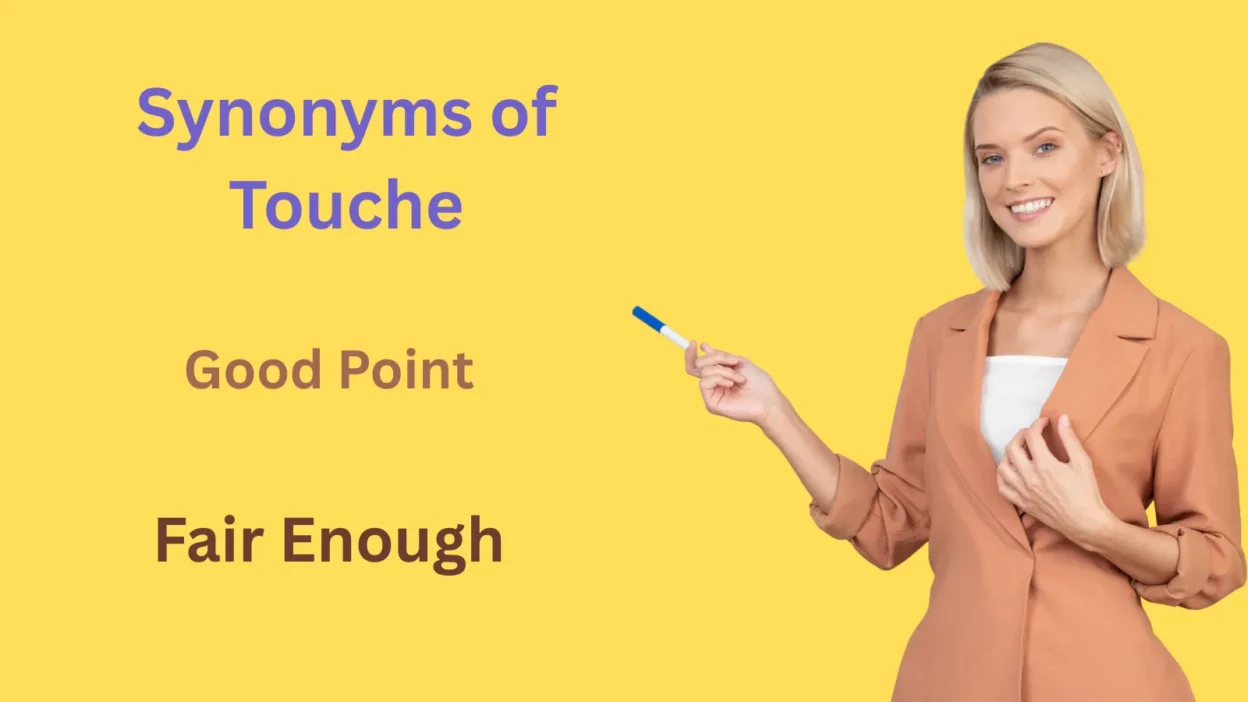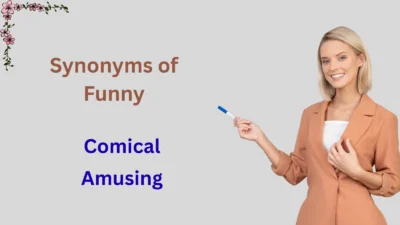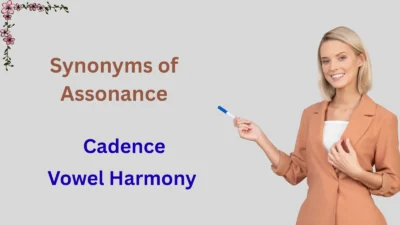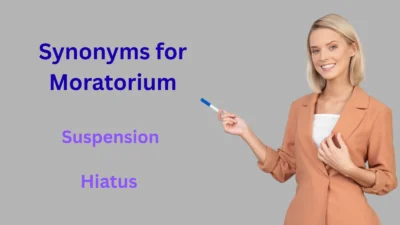Synonyms of touché help you express agreement, admiration, or playful acknowledgment when someone makes a clever remark. The term “touché,” borrowed from French fencing, literally means “touched”—but in everyday English, it’s a witty way to say “good point” or “you got me.”
While “touché” carries a refined, intellectual flair, there are many other ways to convey the same spirit in conversation. From formal phrases like “well said” to casual options like “nice one” or “you win this round,” each synonym brings its own tone and nuance.
In this article, you’ll discover alternatives to “touché”—complete with meanings, examples, and guidance on when to use them in friendly banter, debates, or professional exchanges.
Understanding the Meaning of “Touché”
The word touché comes from French fencing, where it literally means “touched.” In conversation, it is used when someone makes a clever or witty remark—especially if they’ve scored a good point in an argument. It acknowledges the other person’s sharpness with a mix of respect, humor, and sometimes self-deprecation.
Unlike other acknowledgment words, touché has a playful, intellectual quality. It’s often used in debates, jokes, or light banter to signal admiration for the other person’s clever comeback. Because it carries a French flair, it can feel more refined or witty than simply saying “good point.”
Below, we’ll explore 30 synonyms of touché, their meanings, and how to use them effectively in conversation and writing.
30 Synonyms of Touché with Usage Guidance
1. Good Point
Meaning: Acknowledgment that someone made a valid remark.
Example: “Good point—I hadn’t thought of it that way.”
Use When: You want a direct, simple acknowledgment without humor.
2. Fair Enough
Meaning: Admitting the other person’s argument is reasonable.
Example: “Fair enough, I see your side.”
Use When: Keeping the tone casual and cooperative.
3. Well Said
Meaning: Praising someone’s clever or accurate statement.
Example: “Well said, that sums it up perfectly.”
Use When: Respectful, slightly formal approval.
4. Point Taken
Meaning: Acceptance of someone else’s perspective.
Example: “Point taken, I’ll reconsider my stance.”
Use When: Professional or serious settings.
5. I’ll Give You That
Meaning: Conceding the other person’s cleverness.
Example: “I’ll give you that—you got me there.”
Use When: Friendly banter or casual debates.
6. You Got Me
Meaning: Admitting defeat in a playful or humorous way.
Example: “Okay, you got me with that one.”
Use When: Lighthearted acknowledgment.
7. Touché Indeed
Meaning: A fuller, more emphatic version of “touché.”
Example: “Touché indeed—that comeback was brilliant.”
Use When: Keeping the original flair but adding emphasis.
8. Well Played
Meaning: Recognizing cleverness as if in a game.
Example: “Well played, that was smart.”
Use When: Playful, witty exchanges.
9. Nice One
Meaning: Casual praise for someone’s clever remark.
Example: “Ha! Nice one, I walked into that.”
Use When: Informal conversations among friends.
10. Good Comeback
Meaning: Direct praise for a witty reply.
Example: “That was a good comeback!”
Use When: Highlighting humor or verbal sharpness.
11. Clever
Meaning: Simple acknowledgment of wit.
Example: “That was clever—I didn’t expect it.”
Use When: Polite but slightly understated recognition.
12. Score One for You
Meaning: Giving credit for winning a point.
Example: “Okay, score one for you this time.”
Use When: Competitive yet playful tone.
13. You Win This Round
Meaning: Playfully conceding in a debate.
Example: “Alright, you win this round.”
Use When: Banter with friends, gaming, or light arguments.
14. Fair Play
Meaning: Acknowledgment of fairness and wit.
Example: “Fair play—that was sharp.”
Use When: British English, casual recognition.
15. Well Put
Meaning: Complimenting clarity and articulation.
Example: “That was well put—I couldn’t argue with it.”
Use When: Professional or academic discussions.
16. Sharp
Meaning: Recognizing keen intelligence or wit.
Example: “Sharp reply—I didn’t see it coming.”
Use When: Playful but admiring tone.
17. Bang On
Meaning: Exactly correct.
Example: “You’re bang on with that observation.”
Use When: British slang, casual conversations.
18. That’s True
Meaning: Agreeing with correctness.
Example: “That’s true—I can’t deny it.”
Use When: Neutral acknowledgment without humor.
19. You Nailed It
Meaning: Perfectly expressed.
Example: “Wow, you nailed it with that reply.”
Use When: Enthusiastic and informal praise.
20. Right On
Meaning: Strong agreement.
Example: “Right on, I totally agree.”
Use When: Energetic, casual, or cultural discussions.
21. Exacto
Meaning: Spanish for “exactly,” used playfully in English.
Example: “Exacto—that’s exactly the point.”
Use When: Adding a foreign-language flair, like “touché.”
22. Good Catch
Meaning: Recognizing when someone spots a mistake.
Example: “Good catch—I overlooked that.”
Use When: Professional settings or proofreading.
23. On Point
Meaning: Perfectly accurate.
Example: “That comment was right on point.”
Use When: Modern slang, casual contexts.
24. Nicely Done
Meaning: Polite acknowledgment of a good remark.
Example: “Nicely done—you had the last word.”
Use When: Friendly, supportive settings.
25. True Enough
Meaning: Acknowledging partial truth.
Example: “True enough, I can’t argue with that.”
Use When: Mild concession, not full agreement.
26. You Got a Point
Meaning: Recognizing merit in someone’s remark.
Example: “You got a point there, I’ll admit.”
Use When: Informal debates.
27. Boom
Meaning: A dramatic acknowledgment of a powerful statement.
Example: “Boom! That was the perfect reply.”
Use When: Fun, modern, internet-style banter.
28. That’s Solid
Meaning: Strong, unshakable reasoning.
Example: “That’s solid logic—I respect it.”
Use When: Informal, supportive acknowledgment.
29. You Got It
Meaning: Admitting correctness.
Example: “You got it—that’s exactly right.”
Use When: Simple, neutral, or instructional tone.
30. Respect
Meaning: Direct acknowledgment of cleverness.
Example: “Respect—that was a killer comeback.”
Use When: Casual, urban slang tone.
Choosing the Right Synonym Based on Tone and Context
- Professional & Formal: Use point taken, well said, well put, or good point.
- Casual & Friendly: Use nice one, you got me, you win this round, or boom.
- Playful & Competitive: Use well-played, score one for you, clever, or fair play.
- Witty & Intellectual: Stick to touché, touché indeed, exacto, or sharp.
Cultural Note: Some phrases like bang on and fair play are more common in British English, while boom and on point are tied to modern internet culture. Choosing the right synonym depends on whether you want your response to feel formal, witty, playful, or slangy.
Conclusion :
Synonyms of touché offer many stylish ways to recognize someone’s clever remark or strong argument. Whether you prefer a witty response like “well played,” a formal acknowledgment like “point taken,” or a casual reply like “nice one,” each phrase lets you match the tone of the moment.
Choosing the right synonym depends on your audience and mood—professional, playful, or intellectual. By expanding your vocabulary beyond “touché,” you can respond with more flair, confidence, and personality in every conversation.





